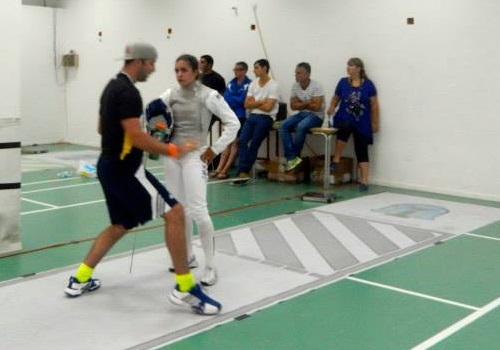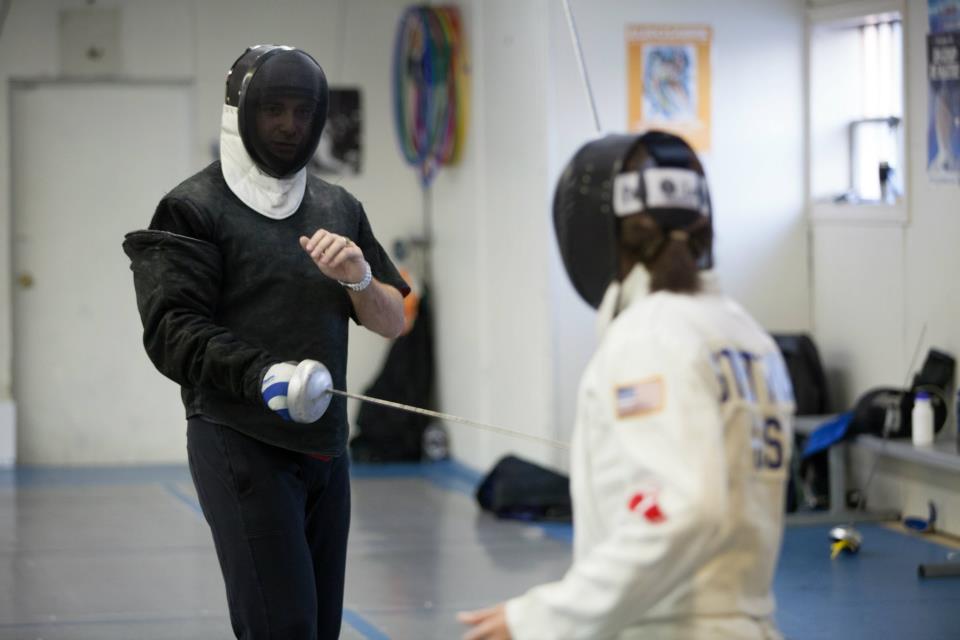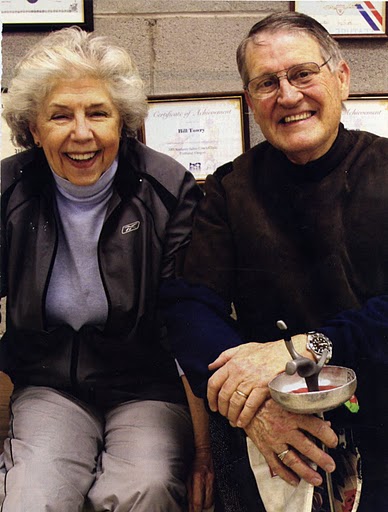In July 2003, Jeff Harman attended the United States Fencing Association’s Coach’s College. Created with the goal of improving American fencing by improving its fencing coaches, the Coach’s College is staffed by the best fencing talent available. Jeff’s account follows:
The USFA has put together a program that trains fencing coaches and teachers to be better at what they do. The training is at three different levels with “three” being the highest. Each weapon type is taught separately. The goal of this training is to create a national coaching environment with consistency and continuity, which will ultimately lead to a well-taught cadre of youth fencers. The training is focused on safety, comprehension of skills and teaching ability.
The USFA Coaches College is held at the Olympic Training Center in Colorado Springs, Colorado in mid-summer. The facility is located in a residential part of town and is convenient to the many attractions of the area. The schedule, however, limits one’s time for participating in the local scene.
Excerpts from my personal journal. After driving down to the OTC from Denver, I realized to my surprise that I was feeling a bit apprehensive. After checking in with security I made a brief circuit of the compound. The familiar 5 rings are everywhere and I can’t stop grinning! After seeing the Olympics on TV for so many years it’s just wild to actually be here at the OTC!! Checking in was a breeze and I soon found my dorm room. Oh happy day, it’s got AC!!! Actually, it looks like all the buildings have air conditioning so maybe this will be bearable after all. Being from a far northern clime, I was pretty concerned about the heat. 93 degrees F the first day. I put down my stuff and went in search of a barber.
Arrival day consists of orientation by the instructors. All questions are answered and expectations communicated. Several volumes of study material are distributed with promises of more to come. The schedule for the coming week is distributed and discussed. First on the agenda is Safety and CPR training. This takes a day and a half and covers Sport Safety, Accident Prevention, CPR and emergency situations. This is pretty intensive training. You are tested and grilled in both written and practical applications. If you pass, you are rewarded with a Red Cross Approved Adult and Child CPR card (good for 1 year) as well as a Sport Safety Training card (3 years) recognized by Red Cross and the United States Olympic Committee.
Yippee Skippee!! I can do CPR! Hope I never have to but it feels good to know that I can do it if necessary. I’ve always wanted to get the training but couldn’t find the time. Now that I have the card I’ll have the incentive to renew it every year. I need to make some changes on how we do things in our fencing club though. Waivers signed by kid’s parents, update the first aid kit. Put up some signs and phone numbers. I know I should have done this stuff before now… been lucky so far.
The schedule for the week has you starting at 8:00 am and working through 8:00 pm every day, with breaks for lunch and dinner. The application information discusses the intensity of the workout drills and the effects of high altitude and proper hydration. It mentions this several times. Take it seriously. It is hard to breathe at 6600 feet when you are used to about 50 feet above sea level. Do drink lots of water for a week or so before you go there. Do plan on a serious physical workout several times a day.
I can only speak to Level 1 Foil as this was my first trip to the College. The instructors had a good feel for the group that they were working with. The instruction was first rate and well presented. It consisted of a series of footwork drills done individually, followed by a series of bladework drills done with a partner. Emphasis is placed on teaching the proper skills by giving cues to the student.
Properly done, the student is led through a progressive lesson with little conversation from the coach. The coach is taught to “let his blade do the talking”. Corrections are made and the lesson culminates with the student having a clear understanding of the technique being taught and circumstances leading up to the timely execution of it.
Man am I glad I bought the big bottle of Ibuprofin! I lunged more today than I have in the last 2 weeks. Can’t help but notice that I’m not in the best shape of all the people here, but I’m not the worst either. Quite a cross section of students here. As young as 17 and old as, what? Maybe 52?
Several times I have been receiving group instruction and just had to pinch myself as I realize that we are all here for the same purpose, at the OTC, dealing with and discussing the same shared issues about a sport that has been in the modern Olympics longer than nearly every other sport currently offered. All of the new coaches in this class are pretty squared away and easy-going. That’s nice. I’ve decided to be a sponge and absorb as much as I can from everybody else’s experiences, past and present. It’s amazing how much collective information we have between us. I’m also finding out I know more about teaching than I thought I did. Some of them are having a difficult time playing the role of instructor.
The Olympic Training Center consists of Gymnasiums, Classrooms, Weight lifting rooms, Shooting Center, Swimming Center, Gift Shop, Dorms and various administrative buildings. The center of the social scene is the cafeteria/lounge. Although athletes in training are encouraged to eat a healthy training diet there is unlimited access to the cafeteria from 7 am to 7 pm. They are expected to make the right choices in diet selection. Sport nutrition is a featured segment of the coaches training. The lounge area features several large screen televisions situated conveniently around the vaulted atrium, usually tuned to ESPN. Many of the coaches in training will use the generous 1 1/2 hour lunch and dinner breaks to study for the many written and practical exams. There are no TVs in the dorms.
If you decide to participate in the USFA Coaches College, be prepared for total immersion in the sport of fencing. Everything is geared toward making you a better coach/teacher with the expectation that you will deliver your skills to the students you currently work with. You may become a better fencer as the result of this experience (a happy byproduct), but not the main goal of the effort. There’s a lot of young talent out there that needs the help of a decent coach to excel. Coaches College will give you the tools to help them achieve their goals, what ever they may be.
I was cornered by a couple of the instructors to see how I was coping with the heat and altitude. I told them it was different but I was working on keeping hydrated and staying out of the sun. I was holding up o.k. Then they wanted to get a critique of the instruction so far. I told them that sometimes I felt like I was surfing a tidal wave that was looming dangerously overhead. The amount of information being packed into my head was almost overwhelming; not quite! But almost. I feel like I’m being stretched nearly to the limit of my ability to absorb information. But then there’s a little reprieve while I digest it and then we move on.
I couldn’t (and probably wouldn’t) have designed the course any better as far as timing and quantity of info. Just when I thought I wasn’t getting it, I’d realize that some of the rest of us were struggling too and we could ask our peers or the instructors and then it all came together and we went on to the next concept or drill. The phrase “total immersion” keeps coming to mind and it is exactly the way I feel. When you love this game as much as I do it is such a high to be able to commit 100% of your time to it and to get so much back from your investment.
Testing. The end of your week is the climax. Test day. You will have the opportunity to be tested by a jury of Fencing Masters on your ability to execute footwork and bladework. You will receive an honest critique of your ability as an instructor. It can be a tense moment if you let it. Just remember, they want you to be a better coach. Pay attention and practice the skills as taught and you will do well. (Sounds like the kind of thing we tell our students, doesn’t it!)
(The Coaches College was first organized in 1985 by Jack Keane. It is an annual event at the the Olympic Training Center in Colorado Springs, Colorado.)





